
The Internet's Premier Classical Music Source
Related Links
- Pachelbel Reviews
- Latest Reviews
- More Reviews
-
By Composer
-
Collections
DVD & Blu-ray
Books
Concert Reviews
Articles/Interviews
Software
Audio
Search Amazon
Recommended Links
Site News
 CD Review
CD Review
Johann Pachelbel
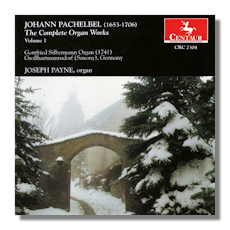
Volume 1
- Chorale Preludes:
- "Da Jesus an dem Kreuze stund"
- "In dich hab' ich gehoffet, Herr"
- "Meine Seele erhebet den Herren"
- "O lamm Gottes unschuldig,"
- "Vater unser im Himmelreich"
- "Wie schön leuchtet der Morgenstern"
- "Wir glauben All' an einen Gott"
- "Wo Gott zum Haus nicht gibt sein Gunst" I & II
- Ciacona in F minor
- Magnificat Fugues sexti toni #2-10
- Toccata & Fugue in B Flat Major
- Toccatas
Joseph Payne, organ
Centaur CRC2304

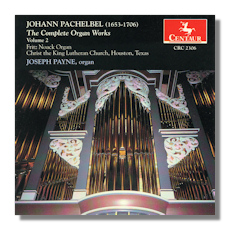
Volume 2
- Chorale Preludes:
- "Ach Herr, mich armen Sünder" II
- "Allein Gott in der Höh' sei Ehr'"
- "Allein zu dir, Herr Jesu Christ": "Alio modo"
- "Der Tag der ist so freudenreich"
- "Gelobet seist du, Jesu Christ"
- "Nun komm der Heiden Heiland"
- "Nun lob, mein' Seel', den Herren"
- "Vom Himmel hoch, da komm' ich her"
- "Was Gott tut, das ist wohlgetan"
- Chaconne in D Major
- Magnificat Fugues tertii toni #1-11
- Prelude & Fugue in E minor
- Ricercare in C minor
- Toccata in C Major
- Toccata in E minor
Joseph Payne, organ
Centaur CRC2306

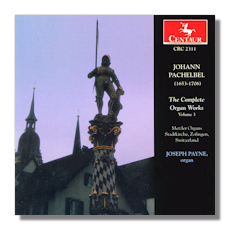
Volume 3
- Chorale Preludes:
- "An Wasserflüssen Babylon"
- "Ein Feste Burg ist unser Gott"
- "Jesus Christus, unser heiland"
- "Nun freut euch, lieben Christen g'mein"
- "Warum betrübst du dich, mein Herz" I & II
- "Wenn wir in höchsten Nöten sein" I & II
- Fantasia in D minor
- Fantasia in G minor
- Magnificat Fugues primi toni #1-10
- Musicalische Sterbens-Gedancken: Christus, der ist mein Leben
- Prelude & Fugue in D minor
- Toccata & Fugue in G Major
Joseph Payne, organ
Centaur CRC2311

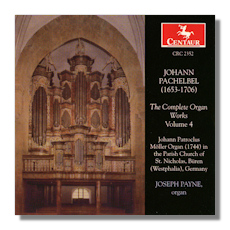
Volume 4
- Chorale Preludes:
- "Ach wie elend ist unsre Zeit"
- "Durch Adams Fall ist ganz verderbt"
- "Gott hat das Evangelium"
- Chaconne in D Major
- Chorale Variations on "Freu dich sehr, o meine Seele"
- Chorale Variations on "Herzlich tut mich verlangen"
- Fantasia in D minor
- Fugue in B minor
- Fugue in D minor
- Magnificat Fugues quinti toni #1-12
- Toccata in D minor
Joseph Payne, organ
Centaur CRC2352

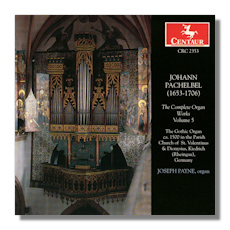
Volume 5
- Chaconne in C Major
- Choral Prelude "zu Präambulieren": Dies sind die heil'gen zehn Gebot
- Hexachordum Apollinis:
- #1, Aria prima
- #2, Aria secunda
- #3, Aria tertia in F Major
- #4, Aria quarta in G minor
- #5, Aria quinta in A minor
- Magnificat Fugue sexti toni #1
- Prelude in D minor
- Toccata in F Major
Joseph Payne, organ
Centaur CRC2353

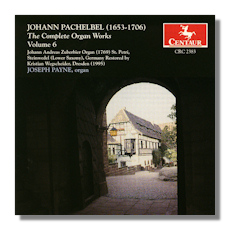
Volume 6
- Chorale Preludes:
- "Erbarm dich mein, o Herre Gott"
- "Ich hab' mein' Sach' Gott heimgestelt"
- "Ich ruf su dir, Herr Jesu Christi" I & II
- "Komm, Gott Schöpfer heiliger Geist"
- "Nun last uns Gott dem herren"
- "Wenn mein Stündlein vorhanden ist"
- "Werde munter, mein Gemüte"
- Fugue in E minor
- Magnificat Fugues primi toni #11-23
- Prelude & Fugue in G Major
- Toccata & Fugue in D Major
Joseph Payne, organ
Centaur CRC2383

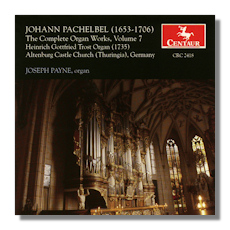
Volume 7
- Chorale Preludes:
- "Alle Menschen müssen sterben"
- "Allein Gott in der Höh' sei Ehr'"
- "Allein zu dir, Herr Jesu Christ"
- Chaconne in F Major
- Magnificat Fugues octavi toni #1-13
- Ricercare in F Sharp minor
- Toccata & Fugue in C Major
Joseph Payne, organ
Centaur CRC2418

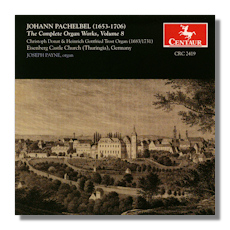
Volume 8
- Chorale Preludes:
- "Es woll' uns Gott genädig sein" I & II
- "Herr Gott, dich loben alle wir"
- "Jesus Christus, unser heiland"
- "Was mein Gott will, das g'scheh allzeit"
- Aria con Variazoni in A minor
- Fantasia in A minor
- Fantasia in C Major
- Fantasia in E Flat Major
- 2 Fugues in A minor
- 2 Fugues in C Major
- Magnificat Fugues septimi toni #1-8
- Prelude in A minor
- Prelude in E Flat Major
- Toccata in C minor
- Toccata & Fugue in C Major
Joseph Payne, organ
Centaur CRC2419

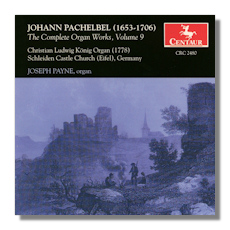
Volume 9
- Chorale Preludes:
- "Ach was soll ich Sünder machen"
- "Auf meinen lieben Gott"
- "Der Herr ist mein getreuer Hirt"
- "Gott der Vater wohn uns bei"
- "Gott Vater, der du deine Sonn"
- "Herr Jesu Christ ich weiss gar wohl"
- "Kommt her zu mir, spricht Gottes Sohn"
- "Mag ich Unglück nicht wiederstahn"
- "Meine Seele erhebet den Herren"
- "O Mensch, bewein dein Sünde gross"
- Aria con Variazoni in A minor
- Fugue in A Major
- Prelude in G minor
- Toccata in G minor
Joseph Payne, organ
Centaur CRC2480

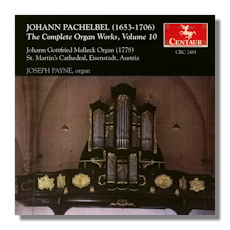
Volume 10
- Chorale Preludes:
- "Christ lag in Todesbanden"
- "Christ unser Herr zum Jordan kam"
- "Erhalt uns, Herr, bei deinem Wort"
- "Es spricht der Unweisen Mund wohl" I & II
- "Wo Gott der Herr nicht bei uns hält" I & II
- Chaconne in D minor
- 6 Fugues in C Major
- 2 Fugues in G Major
- Hexachordum Apollinis: #6, Aria Sebaldina in F minor
- Magnificat Fugues quatri toni #1-8
- Magnificat Fugue in C Major
- Toccata in C Major
- Toccata in D minor
- Toccata in G minor
Joseph Payne, organ
Centaur CRC2481

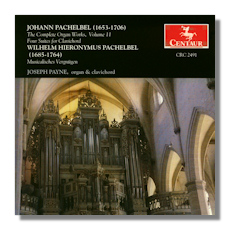
Volume 11
- Chorale Preludes:
- "An Wasserflüssen Babylon"
- "Komm Gott Schöpfer, heiliger Geist"
- "Ach Gott vom Himmel, sieh darein" I & II
- "Ach Herr, mich armen Sünder" I & II
- Suite in A Flat Major
- Suite in C minor
- Suite in E Flat Major
- Suite in F Sharp minor
- Wilhelm Hieronymus Pachelbel:
- Praeludium & Fugue in D Major
- Toccata in G Major
- Fantasia super Meine Seele, lass es gehen
- Partite super O Lamm Gottes unschuldig
Joseph Payne, organ
Centaur CRC2491
This is an important, comprehensive and superbly-executed series. It makes an outstanding contribution to the appreciation of German mid-Baroque (the generation before J.S. Bach) organ music in general and the work of Johann Pachelbel (1653-1706) in particular. It is wholeheartedly recommended for a variety of audiences. For:
- lovers of the organ in all its varieties; Pachelbel was certainly an expert in as many forms as were current in the late seventeenth century
- anyone familiar only with that piece of Pachelbel's (the Canon in D – actually the only canon the composer wrote) and who senses there has to be more… organist Joseph Payne proves that there is – a hundred times over
- anyone interested in the mid-Baroque instrumental repertoire looking for beautiful music otherwise mostly otherwise unplayed, yet of immense depth and sophistication
- those who want to experience the results of hugely imaginative and adept musicianship: Payne is magnificent
One thing must be made clear at the outset: remarkably, no two pieces of Pachelbel's are the same. If they use the same form, they're different in length; if they require the same attention span, they differ in register; if they allude to the same religious source, they differ in approach; if they originate in similar sound worlds, they use different tempi. And so on. For that reason, it was not hard for Payne and his producers on the enterprising Centaur label to arrange releases which respected this richness and emphasize the variety. But Payne's musicianship nevertheless would have been sufficiently accomplished not to have needed Pachelbel's immense imaginative genius in order to have produced such a stimulating set of collections! Still, the listener's attention to the series never never flags; each new track on these well-produced and presented CDs offers something exciting and new. That's quite an achievement over almost 200 works.
This freshness has little to do with the fact that over the course of these eleven CDs Payne plays on a different organ almost every time. They're mostly in Germany and Switzerland, though Volume 2 was recorded in Texas. And they're generally unrestored. This imparts additional interest, of course: different acoustics, new atmospheres, contrasting sounds altogether. But that Payne's strengths in performance also overlay the variations in venue and circumstance confers a sense of the consistency on the music, indirectly revealing Pachelbel's genius.
For the purposes of this review, hardly any single pieces are singled out for attention: the totality of Payne's achievement is necessarily made up of its parts. And they're all as they should be. There are high points… the "Hexachordum Apollinis" (mostly on CD 5) and the "Magnificat Fugues", for example; and individual gems such as the Chorale Preludes on the very first disk as well as the gentle yet penetrating pieces that occupy disk 4. But in fact each piece has something to recommend it, something different; and something special which Payne draws out ‐ without fuss or glare. Just letting the music lead where it will.
Another important point is that works (such as the 21 suites) conceivably intended for the organ may in fact be better suited to the harpsichord (etc): Pachelbel typically only indicated "clavier" on his scores, not all of which were published in his lifetime. So the questions of what the corpus includes for what would extend to a whole waking day if enjoyed all at once are important ones. The decisions of Payne and his producer(s) seem always to have been wise and sustainable ones; and ones likely to satisfy the specialist as well as casual listener.
Given his stature, perhaps surprisingly little is generally known and appreciated about the life and pre-occupations of Johann Pachelbel: he perfected the South German organ tradition; played a major part in developing the chorale prelude and fugue; wrote a significant and substantial body of sacred choral music as well as keyboard and chamber music; and was a teacher of renown… his pupils included Johann Christoph Bach (1671-1721); and was much more widely known during his comparatively short life than subsequently. It would be nice to think that Pachelbel is now due for the same sort of revival as has begun for Biber and Buxtehude in recent years. There is only one substantial study of Pachelbel in English – and that unpublished as such but available from UMI: the PhD dissertation of Kathryn Welter, "Johann Pachelbel: Organist, Teacher, Composer, A Critical Reexamination of His Life, Works, and Historical Significance" (1988, Harvard University, Cambridge, Massachusetts).
Born in Nuremberg, pachelbel developed an early interest in Italian music from his teacher (Caspar Prentz) in Regensburg who had himself been a pupil of Johann Kaspar Kerll, a composer taught by Frescobaldi and much influenced by such composers well outside his immediate (local) circle as Carissimi. What's more, Italian music was one of the prevailing tastes in Vienna, where Pachelbel worked for five years in his early twenties. He may have been taught there by Kerll too. From 1678 to 1690 the composer lived and worked in Erfurt with close connections to the Bach families. After short stays in Stuttgart and Gotha, Pachelbel moved back to Nuremberg in 1695 to spend the last years of his life as organist there.
At various points in his career Pachelbel was invited to take up positions without the usual examinations; he was admitted to the Gymnasium Poeticum at Regensburg when the school was already over quota; the authorities at Gotha contributed – exceptionally – towards Pachelbel's traveling expenses; he was twice offered positions at Stuttgart and Oxford University. It's obvious he was considered an exceptional musician by his contemporaries.
As far as his stay in Nuremberg is concerned, there is a double irony: the town was notorious for its resistance to "outside" cultural influence. Pachelbel is unlikely to have heard Italian performers there nor to have been influenced first hand by those of the same cosmopolitan musical disposition as he so palpably exuded. On the other hand, the virtual lines of descent from other major figures outside this milieu (see above), and with the Bach family (above, again), meant that he was no isolate or self-taught eccentric. Indeed, the lyrical, at times almost rhapsodic nature, the flair and ebullient style of many of the pieces we hear in the course of this collection are clearly the result of multiple significant influences other than those which the courts and towns in which he lived could have offered by themselves.
Yet now, despite Pachelbel's seemingly bottomless creativity, his sensitivity to the music which in fact did influence him, his urbanity and obvious professional modesty, he is known by just a handful of works, rarely performed and under-recorded. This set of complete organ works from Centaur by Joseph Payne – recorded actually over the last ten years and still standing in the catalog as a high point of its kind – deserves at the very least to broaden his acceptance amongst non-specialists and even with those who are otherwise well versed in music of the period.
Joseph Payne was born in 1941 in Mongolia, of British and Swiss parents. He received his training in those two countries, and the United States, where he is now based (in Boston). As early as 1965, at the age of 24, Payne began to record (then somewhat) recherché repertoire – of virginal pieces, before that instrument (or even that instrument family) had gained the acceptance with mainstream music-lovers that we now take for granted. Not that "unusual" areas have been Payne's only distinguishing characteristic: in the mid 1980s his world première recording of the Bach Neumeister chorales was immensely successful. It's clear from the vigor, breadth of vision and unbounded confidence from first to last in this series that Payne would prefer not to have Pachelbel considered wither a minor or a "specialist" composer.
In this Centaur set he has not recorded a "survey" per se. Some such enterprises are complete for the sake of it and necessarily (and often understandably) contain their fair share of second rate, uninspired or mundane material. In this case almost every single track stands up in its own right, repays careful and repeated hearing and has a variety of interests and appeals. Such appeals are also valid aside from the historically significant position that Pachelbel occupied and to which his musical importance is all too often sadly relegated. That is, Payne consistently and cleanly reveals the soul and substance of Pachelbel's intentions.
The organization of pieces across the CDs is also to be commended. There is variety. Intentionally, surely. But also sequences which aid a more concentrated and in depth appreciation of Pachelbel's concerns: the grouping of figurative, then abstract, experimental then rhetorical. This all underlines Payne's impressive grasp of how the composer "works". From the first note, and across all eleven discs, Payne achieves an assured balance between control (his approach has been described as somewhat "conservative", which should not be taken to mean either unadventurous or stodgy) and spontaneity.
Indeed, each piece emerges as an event in its own right. As though the performer had just sat down afresh each time and were only interested at that moment in articulating what the music at hand had to communicate. This is quite an achievement. Particularly when set alongside his gift for understanding and exposing the overall, persistent and changing pre-occupations of the composer. In other words, Payne's is a very honest and durable approach. Not only does he enable us to dip in and out of the series; but also to accumulate a comprehension of the music's overall directions and strengths.
To return to the "conservative" epithet, Payne has in many ways provided us with a "Reference" set of interpretations. But the key word is still interpretations. There is never anything perfunctory about the generosity yet exactness of tempi in Payne's consideration of the structure of each piece. Nothing either lazy or gratuitously lustrous in the luminosity with which he articulates their harmonic and melodic richness. Not a hint of the guileful in the judicious ornamentation employed. Nor anything humdrum about the way in which Payne underlines the way that Pachelbel's key changes work their magic. In other words informed precision is employed in the same way as a good dictionary compiler works, rather than an illustrator.
There is a "rival" set of the Pachelbel Complete Organ Works, on Dorian, with Antoine Bouchard. It too decisively lifts the composer out of the crazy compilation and soppy sampler pits into which the marketeers would have him fall. Payne's series, though, has greater authority and stability while not missing out on opportunities to point up Pachelbel's individuality, creativity and flair. Both sets are similarly priced and run to eleven CDs.
To return at the end to Pachelbel's legacy is to note the many students whom he influenced. Amongst these was his son, Hieronymus, who lived from 1686 to 1764. In Hieronymus Johann expressed great confidence as his most gifted pupil. Indeed Hieronymus succeeded his father in the posts at Erfurt and Nuremburg. The eleventh CD in the set contains four pieces by Hieronymus; they provide a further angle on the greatness of the part which Pachelbel senior played in the Golden Age of Lutheran church music. It's as significant a movement for music as was Napoleonic Vienna or the France of Louis XIV. Yet we seem able only to appreciate it by rare glimpses into isolated pieces. Perhaps Payne's achievement will illuminate the treasure chest of which it consists.
Each set of liner notes is well-written, by Payne himself, and contains just the right of background historical information; discussion on the works and relevant detail on Pachelbel's relation to them; and facts about the organs used. Each booklet has a different and appealing photograph of a location associated with the recording and/or the composer. As is obvious by now, this is a landmark series; it reveals so much about the music it explores. Above all, perhaps, it will provide to specialist and generalist alike a huge wealth of immensely enjoyable, memorable and beautiful music. Unhesitatingly recommended in every way.
Copyright © 2009, Mark Sealey




















